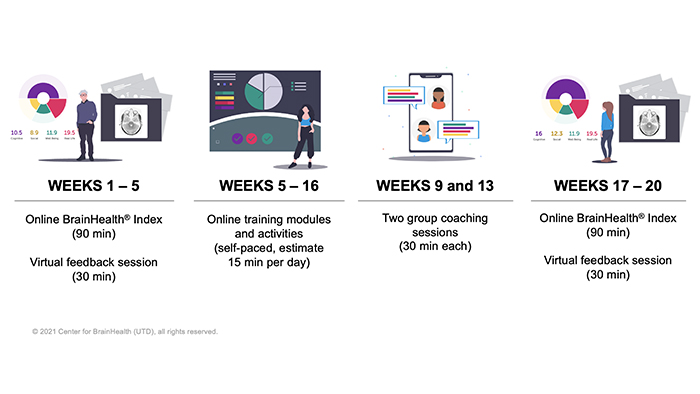Freeman Teams Up With the Center For BrainHealth to Help Improve Employee Wellbeing, Address COVID Stressors

With so many people across the world facing a plethora of mental and emotional challenges, we’ve come to understand in no uncertain terms how stress can negatively impact our performance, both personally and professionally.
After recognizing the deleterious effects that pandemic-related stressors were having on its workforce, Freeman enlisted the help of the Center for BrainHealth, a leading brain research center at The University of Texas at Dallas, to help improve employee wellbeing, health and performance via an innovative company-wide initiative.
Launched in March, the BrainHealthy Workplace program is a complimentary, voluntary and completely confidential 20-week program designed to assess and strengthen brain fitness in four key areas: cognition, wellbeing, social interaction and daily function. Available to all Freeman employees, it features a personal BrainHealth Index metric, coaching to set individual goals, group coaching to promote workplace innovation and online training modules teaching science-based strategies to boost brain capacity and mental efficiency at work and at home.
Featuring game-like elements and coaching to help people practice brain-healthy habits to improve their ability to reason, problem-solve, innovate and adapt, participants can access the content from anywhere through an online, password-protected BrainHealth dashboard.
“The events industry was one of the hardest hit during COVID-19, putting our people under lots of additional stress,” explained Bob Priest-Heck, CEO of Freeman. “As we look to invest in our people and their well-being, the Center for BrainHealth’s expertise and approach will help our team to not just become more resilient but to also improve their focus and innovation.”
The new three-year initiative at Freeman is part of the Center’s BrainHealth Project, a 10-year study focused on helping healthy people develop habits to improve brain performance and resilience across their lifespans. The program is free and open to the public.

But for those who might think the program is just about improving memory or worker productivity, think again, said Jennifer Zientz, deputy director and head of clinical services at the Center for BrainHealth.
“This program is about enhancing a higher level of health,” Zientz said. “We’re not here to tell anyone what to think but rather [give them a] toolkit about how to think about whatever they’re thinking in a way that strengthens frontal networks, increases brain blood flow and improves synchrony of different brain networks. We’re trying to provide online education and empowerment so that people can use the information the way they want. And what Freeman is interested in is cultivating a brain-healthy culture and it takes a village to make something like that happen.”
Since Freeman’s initial BrainHealthy Workplace program started in mid-April, it has attracted more than 100 employees, with additional groups anticipated to follow. Once the first session is completed, the Center for BrainHealth will process participant feedback and make any necessary tweaks for additional iterations.
The pilot program also marks the center’s foray into the corporate sector after working with myriad groups, including the military, law enforcement, first responders, schools and teachers.
According to Andy Gray, talent development leader at Freeman, the BrainHealthy workplace program not only comes at the perfect time for the company but also fits in well with its corporate culture and values.
“Freeman is all about people, and our employees are at the top of that list, so we wanted to figure out a way to support them in such a challenging and unprecedented time,” Gray explained. “We’ve had a long-standing relationship with the Center for BrainHealth and at the onset of COVID-19, that relationship really enabled us to partner very quickly with one another…as the impact of the pandemic became more clear in the host of unique stresses it created.”
He continued, “We’re excited about the partnership and the ultimate impact that it can have on our folks in being better positioned to manage stress and grow and develop personally. And I think a lot of us are going to need this post-COVID, as well. Nothing is going to be the same, so anything that we can do to support our folks to manage their lives efficiently and effectively in the context of the collective new reality, we want to help with that.”
Don’t miss any event-related news: Sign up for our weekly e-newsletter HERE and engage with us on Twitter, Facebook, LinkedIn and Instagram!


Add new comment